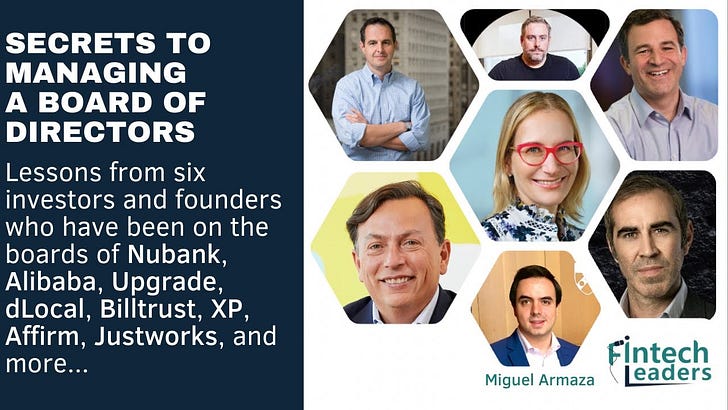This article is part of Fintech Leaders, a newsletter with over 60,000 builders, entrepreneurs, investors, regulators, and students of financial services. I invite you to share and sign up! Also, if you enjoy this conversation, please consider leaving a review on Apple Podcasts, Spotify, or wherever you get your shows so more people can learn from it.
In this special episode, we explore valuable company-building lessons and mistakes shared by 17 of our guests from over the last 2 years. So if you’re building a business, I hope you find it helpful.
This show is divided into four categories of insights:
Organizational Culture
Product Strategy
Leadership Tactics
Sales and Marketing
Each chapter explores critical aspects of building a tech company, featuring the CEOs, Founders, and leaders of companies like Ramp, SoFi, Gusto, Lending Club, Figure, Upgrade, Melio, and Carta, amongst others.
I think this episode is a treasure trove of lessons learned and strategic advice for current and aspiring fintech builders. I’m also including the links to each episode below so that you can dive into each one of them.
Chapter 1 – Organizational Culture
You’ll hear from:
Mike Cagney, CEO/Co-Founder of Figure and Co-Founder of SoFi. Link to original episode.
Matan Bar, CEO/Co-Founder of Melio. Link to original episode.
Prajit Nanu, CEO/Co-Founder of Nium. Link to original episode.
Itai Damti, CEO/Co-Founder of Unit. Link to original episode.
Josh Reeves, CEO/Co-Founder of Gusto. Link to original episode.
Cultural Foundation and Hiring Practices: Founders like Mike Cagney and Matan Bar emphasize the critical importance of establishing a strong cultural foundation from the outset and the significant impact of early hiring decisions on shaping the company's culture. They highlight the need for a deliberate approach to building a team that aligns with the company's values and objectives, as well as the consequences of neglecting cultural fit in the rush to scale.
Prioritizing Urgency and Alignment: Prajit Nanu and Josh Reeves discuss the pitfalls of poor hiring practices, particularly the importance of urgency in a startup environment and the need for alignment in values, motivations, and skill sets. They stress that hiring individuals who do not share the company's sense of urgency or values can lead to detrimental outcomes, underscoring the need for a more nuanced approach to recruitment.
Learning from Mistakes and Adapting: Itai Damti reflects on the multitude of mistakes made and the importance of making them less costly over time. He advocates for a dynamic approach to problem-solving and decision-making, suggesting that companies should strive to learn from their errors and continuously adapt their strategies and operations to mitigate future risks.
Chapter 2 – Product and Revenue Strategy
Renaud Laplanche, CEO/Co-Founder of Upgrade and Co-Founder of Lending Club. Link to original episode.
David Haber, General Partner at a16z. Link to original episode.
Stephany Kirkpatrick, CEO/Co-Founder at Orum. Link to original episode.
Jason Guss, CEO/Co-Founder of Octane. Link to original episode.
Prajit Nanu, CEO/Co-Founder of Nium. Link to original episode.
Jean-Denis Greze, CTO of Plaid. Link to original episode.
Recurring Revenue and Team Building: Renaud Laplanche emphasizes the importance of creating a predictable revenue stream and not going it alone in company building. He highlights the challenges of relying on one-time revenue products and the value of having a supportive and collaborative team from the early stages.
Customer Acquisition and Product Strategy: David Haber and Jason Guss discuss the difficulties in customer acquisition and the importance of a well-thought-out product strategy. They stress the need for products with a broad appeal and a clear understanding of the market, as well as the significance of balancing technology, credit, and capital markets for sustainable growth.
Operational Efficiency and Time to Value: Stephany Kirkpatrick focuses on the importance of operational efficiency and reducing the time to value for customers. She underscores the need for a predictable sales cycle and a rapid transition from signing to active use, which is crucial for forecasting revenue and ensuring customer satisfaction.
Chapter 3 – Leadership and Self Awareness
Eric Glyman, CEO/Co-Founder of Ramp. Link to original episode.
Hristo Borisov, CEO/Co-Founder of Payhawk. Link to original episode.
Ben Miller, CEO/Co-Founder of Fundrise. Link to original episode.
Greg Krasnov, CEO/Co-Founder of Tonik. Link to original episode.
Customer Focus and Decisive Action: Hristo Borisov of Payhawk emphasizes the critical importance of listening to customer feedback and focusing on a clear, prioritized strategy. He also highlights the necessity of timely decision-making, especially when it comes to letting people go, drawing an analogy to sailing where immediate action is often crucial.
Cultural Integrity and Growth Management: Ben Miller from Fundrise reflects on the challenges of maintaining a company's culture during rapid expansion. He notes that seeing the brutal reality quickly and adapting is key to survival.
Leadership Evolution and Resource Allocation: Greg Krasnov of Tonik and Eric Glyman of Ramp discuss the transition from being a hands-on founder to a strategic leader who orchestrates a team's talents. They stress the importance of understanding one's strengths and weaknesses, focusing on hiring quality personnel, and allocating resources effectively to leverage the company's growth and success.
Chapter 4 – Sales and Marketing
Trisha Kothari, CEO/Co-Founder of Unit21. Link to original episode.
Soups Ranjan, CEO/Co-Founder of Sardine. Link to original episode.
Jane Alexander, Chief Marketing Officer of Carta. Link to original episode.
Early-Stage Hiring Caution: Trisha Kothari of Unit21 warns against the common mistake of hiring highly experienced sales VPs too early. Instead, she advocates for initially bringing on optimistic, versatile individuals who can adapt and grow with the startup, then transitioning to seasoned professionals as the company scales.
Founder-Led Sales Importance: Soups Ranjan of Sardine shares the value of founders being directly involved in early sales to gain firsthand customer feedback and understand market needs. This approach not only informs product development but also sets a solid foundation for when it's time to expand the sales team.
Aligned Sales and Marketing Goals: Jane Alexander of Carta talks about the potential pitfalls when sales and marketing teams have conflicting goals. She advocates for unified objectives, such as shared revenue targets, to ensure cohesive efforts and eliminate friction between departments, ultimately driving better overall performance for the business.
Well, my friends, that’s all for now. Thanks for tuning in, and I hope you enjoyed this awesome special episode on company-building lessons. If you’re part of a team that’s building a business, I hope you found it useful. And if you did, please share it with other builders.
Want more podcast episodes? Join me and follow Fintech Leaders today on Apple, Spotify, or your favorite podcast app for weekly conversations with today’s global leaders that will dominate the 21st century in fintech, business, and beyond.
Previous Episodes You May Enjoy:
Video Highlights You Will Definitely Like:
Miguel Armaza is Co-Founder & General Partner of Gilgamesh Ventures, a seed-stage investment fund focused on fintech in the Americas. He also hosts and writes the Fintech Leaders podcast and newsletter.


























Share this post